
|
Astronomy Picture Of the Day (APOD)
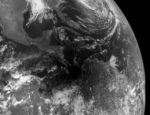 Moon Shadow
Moon Shadow
11.03.1998
When the Moon's shadow reached out and touched the Earth last month, the result was a Solar Eclipse. Such an eclipse is total only for observers located along a narrow path corresponding to the ground track of the shadow's dark central portion or "umbra".
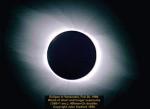 A Total Eclipse of the Sun
A Total Eclipse of the Sun
10.03.1998
On February 26th, it was dark during the day. This total solar eclipse was the last visible from the Americas for this millennium. A total solar eclipse is exciting partly because it is so short.
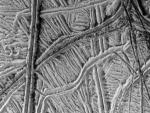 Cracks and Ridges on Europa
Cracks and Ridges on Europa
9.03.1998
Which way to the interstate? What appears to be a caricature of a complex highway system on Earth is actually a system of ridges and cracks on the icy surface of Jupiter's moon Europa. The distance between parallel ridges in the above photograph is typically about 1 kilometer.
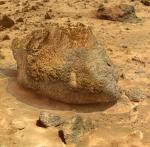 Yogi Rock on Mars
Yogi Rock on Mars
8.03.1998
Yogi is possibly the best photographed rock on Mars. By combining many pictures taken during the Mars Pathfinder Mission last year, scientists were able to create a super-resolution, digitally enhanced image that better allows them to study Yogi's surface and more accurately determine how Yogi was formed.
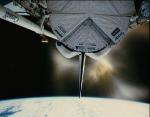 Shuttle Engine Blast
Shuttle Engine Blast
7.03.1998
The Space Shuttle Discovery's orbital maneuvering system (OMS) engine firing produced this dramatic flare as it cruised "upside down" in low Earth orbit. Discovery was named for a ship commanded by Captain James Cook RN, the 18th Century English astronomer and navigator.
 NGC 1818: A Young Globular Cluster
NGC 1818: A Young Globular Cluster
6.03.1998
Globular clusters once ruled the Milky Way. Back in the old days, back when our Galaxy first formed, perhaps thousands of globular clusters roamed our Galaxy. Today, there are perhaps 200 left. Many globular clusters were destroyed over the eons by repeated fateful encounters with each other or the Galactic center.
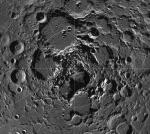 Water Ice At The Lunar Poles
Water Ice At The Lunar Poles
5.03.1998
After seven weeks in lunar orbit, instruments on board NASA's Lunar Prospector spacecraft have produced strong evidence for water ice on the Moon. While not in extensive sheets, this ice could be in the form of crystals, mixed in low concentrations with material in craters around the frigid North and South lunar poles.
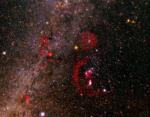 Canaries Sky
Canaries Sky
4.03.1998
This gorgeous view of stars, nebulae, and the Milky Way comes from the dark night sky above the lovely island of La Palma in the Canaries archipelago. The picture was made by a group...
 Aurora Over Alaska
Aurora Over Alaska
3.03.1998
Higher than the highest mountain, higher than the highest airplane, lies the realm of the aurora. Aurora rarely reach below 60 kilometers, and can range up to 1000 kilometers. Aurora light results from solar electrons and protons striking molecules in the Earth's atmosphere.
 560 Kilometers Above Europa
560 Kilometers Above Europa
2.03.1998
This is the closest photograph ever taken of Europa. Last December, NASA's spacecraft Galileo swept past the Jovian moon and took photographs which were released yesterday. Speculation that life-bearing oceans exist beneath Europa's surface caused NASA to put Galileo on orbits that approach Europa.
|
January February March April May June July August September October November December |
|||||||||||||||||||||||||||||||||||||||||||||||||